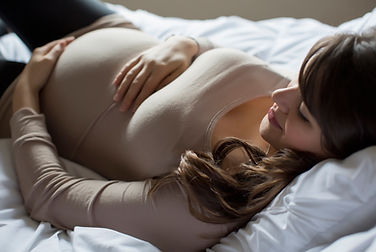Donna Redlick
Infant Developmental Movement Education with Donna

Developmental Movement Education Sessions for you and your baby, involving both play and facilitation:
"In Developmental Movement Education Sessions I guide Parents to support their baby, within the first year of life. The idea within these sessions, is to support the baby to reach their full movement potential and to guide caregiver(s) on how to do that, because movement matters!
Movement sets up patterns in the body that then support brain development and the first year of life is when many of the patterns are established. Offering your baby support to establish these patterns is the best gift you can give them. Integrated movement patterns support healthy body and mind!"


"As our baby grew we were curious about learning how to best support his movement and development. We reached out to Donna again and we worked on learning how to support him from an army crawl/ lizard crawling position to hands and knees. During our time we learned he was favouring his right side over his left side. Donna gave us tools to practice supporting balancing his movement.
Donna is a wonderful teacher and guide - she uses props, visuals, and embodied practice that really support learning. We would highly recommend her support and work to anyone looking to understand developmental movement and growth."
Testimonial from Parents of Baby Taeo (in pictures above)
As an Infant Developmental Movement Educator I can:
-
Educate parents, and caregivers, about developmental movement, working alongside them with their baby, guiding to notice and see movements that are coming into presence.
-
Facilitate development movement patterns through touch, engagement of the senses, rhythm, play, and relationship - then guide parents how to support with touch, etc.
-
Support the progression of development in the first year of life from;
-
support with gravity
-
to rolling
-
to coming to sit
-
to crawling
-
to kneeling
-
to standing
-
to walking!
-
-
Guide caregivers to attune to their baby through bodily presence and engagement of the senses.
-
Meet the baby where they are at, in terms of their own developmental process and rhythm.
-
Focus on the potential of the baby and assist to invite that potential to come forward through facilitation or play.
-
Offer suggestions on how to create a stimulating environment through the use of toys, props, environmental sources, etc., in order to support the baby’s development.
-
Teach handling skills and teaching caregivers how to best support their child through positioning, weight shifting, holding, etc.
-
Create a supportive learning environment for infants and caregivers within the family context.
-
Work in relation to all involved in the infant’s care, and teach body-based relational skills.
-
Hold space for families and caregivers, to develop attunement and curiosity skills, in regards to infant development.

Did you know?
-
The body and mind are one. Integrated movement builds a healthy integrated brain.
-
Touch is essential in our developmental process.
-
Engaging all the senses, and developing curiousity supports the infant’s movement development.
-
Babies movement patterns are supported by being in relationship to self, others, objects (toys), and environment.




60 min session: $105
Three session Package: $285
Five session Package: $450
Sessions are for infants and their caregiver(s):
-
sessions take place in person at your home (Vancouver area) or online via zoom
-
all sessions are guided in a supportive and non-invasive manner.
Are you an Expecting Parent?
This is an excellent time to book a session, especially to learn about what to expect in terms of developmental movement and what stages of development to watch for as you child grows. You can also learn and practice some basic touch and handling skills before your baby is born.
"We first came to Donna during pregnancy - she gave us a lot of confidence with touch and handling skills with our new baby on the way." - Parent Testimonial
Donna is trained as an Infant Developmental Movement Educator (IDME). She is a graduate of the Infant Developmental Movement Program with Moviemento Atlas, a Registered Body-Mind Centering® Program. To find out more about this program click on link https://movimientoatlas.com/en/idme-program/
My Journey to becoming an IDME
Above is a picture of me holding my great-nephew in my arms when he was just two weeks old. From the moment I held him in my arms I knew that I wanted to expand my movement practice to include working with babies. Holding him and witnessing him communicate through his body reminded me of the importance of noticing subtle changes of movement as a form of communication.
When this new bundle of joy came into our family, his Parents would say; ‘let Donna hold him, she knows how to stop him from crying’. It is not that I knew how to ‘stop’ him from crying. What I knew was to listen to what he was telling me through his whole body and I intuitively supported what he needed. I was not yet an Infant Development Movement Educator, at that time, but I was working as a Certified Movement Analyst and a Registered Movement Educator/ Therapist, so I did have some understanding of developmental movement and movement as a language.
Now that I am an Infant Development Movement Educator (IDME), I have come to understand developmental movement at a deeper level, through the lens of Body-Mind Centering®. I have learned skills on how to support babies through their developmental process (cognitively, kinesthetically, and sensorially) within their first year of life, and I have gained knowledge on how to educate caregivers so that they too can support their baby during this process.